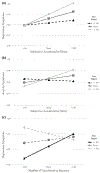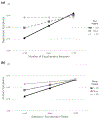Bicultural stress and internalizing symptoms among U.S. Latinx youth: The moderating role of peer and parent support
- PMID: 34264707
- PMCID: PMC8497401
- DOI: 10.1037/cdp0000474
Bicultural stress and internalizing symptoms among U.S. Latinx youth: The moderating role of peer and parent support
Abstract
Objective: U.S. Latinx youth are at increased risk for internalizing problems, perhaps due to high levels of bicultural stress. Taking a resilience perspective, this study examined peer and parent support as potential protective factors that might buffer the effects of bicultural stress on depression and anxiety symptoms among U.S. Latinx youth.
Method: Participants were 306 Midwestern U.S. Latinx adolescents (M age = 15.50%, 46.2% girls) and their primary caregivers who completed individual interviews. Measures included two types of cultural stress (acculturative and enculturative stress) and, for each type, distinguished the extent of exposure to stressors from the subjective intensity of stress reported.
Results: Results indicated that acculturative and enculturative stress were positively associated with internalizing symptoms, while social support from peers and parents was negatively associated with symptoms. Evidence regarding a stress-buffering effect of social support was mixed. Whereas higher levels of peer support mitigated the effects of subjective acculturative stress on depression and anxiety symptoms, parental support did not show a buffering effect. Moreover, in some cases, cultural stress appeared to attenuate the beneficial effect of social support.
Conclusions: Although there was some support for the stress-buffering hypothesis, the impact of bicultural stressors depended on the type of stress considered and whether the focus was on exposure to stressors or subjective stress, as well as the source of social support. The findings highlight the complex effects of bicultural stress on U.S. Latinx youth mental health. (PsycInfo Database Record (c) 2021 APA, all rights reserved).
Figures



References
-
- Aiken LS, & West SG (1991). Multiple Regression: Testing and Interpreting Interactions . Thousand Oaks, CA: SAGE Publications, Inc.
-
- Barrett P (2007). Structural equation modelling: Adjudging model fit. Personality and Individual Differences, 42(5), 815–824. 10.1016/j.paid.2006.09.018 - DOI
-
- Berry J (2006). Acculturative stress. In Wong P & Wong L (Eds.), Handbook of multicultural perspectives on stress and coping (pp. 287–298). Langley, British Columbia, Canada: Trinity Western University.
-
- Cano MÁ, Schwartz SJ, Castillo LG, Romero AJ, Huang S, Lorenzo-Blanco EI, … Szapocznik J (2015). Depressive symptoms and externalizing behaviors among Hispanic immigrant adolescents: Examining longitudinal effects of cultural stress. Journal of Adolescence, 42, 31–39. doi:10.1016/j.adolescence.2015.03.017 - DOI - PMC - PubMed

